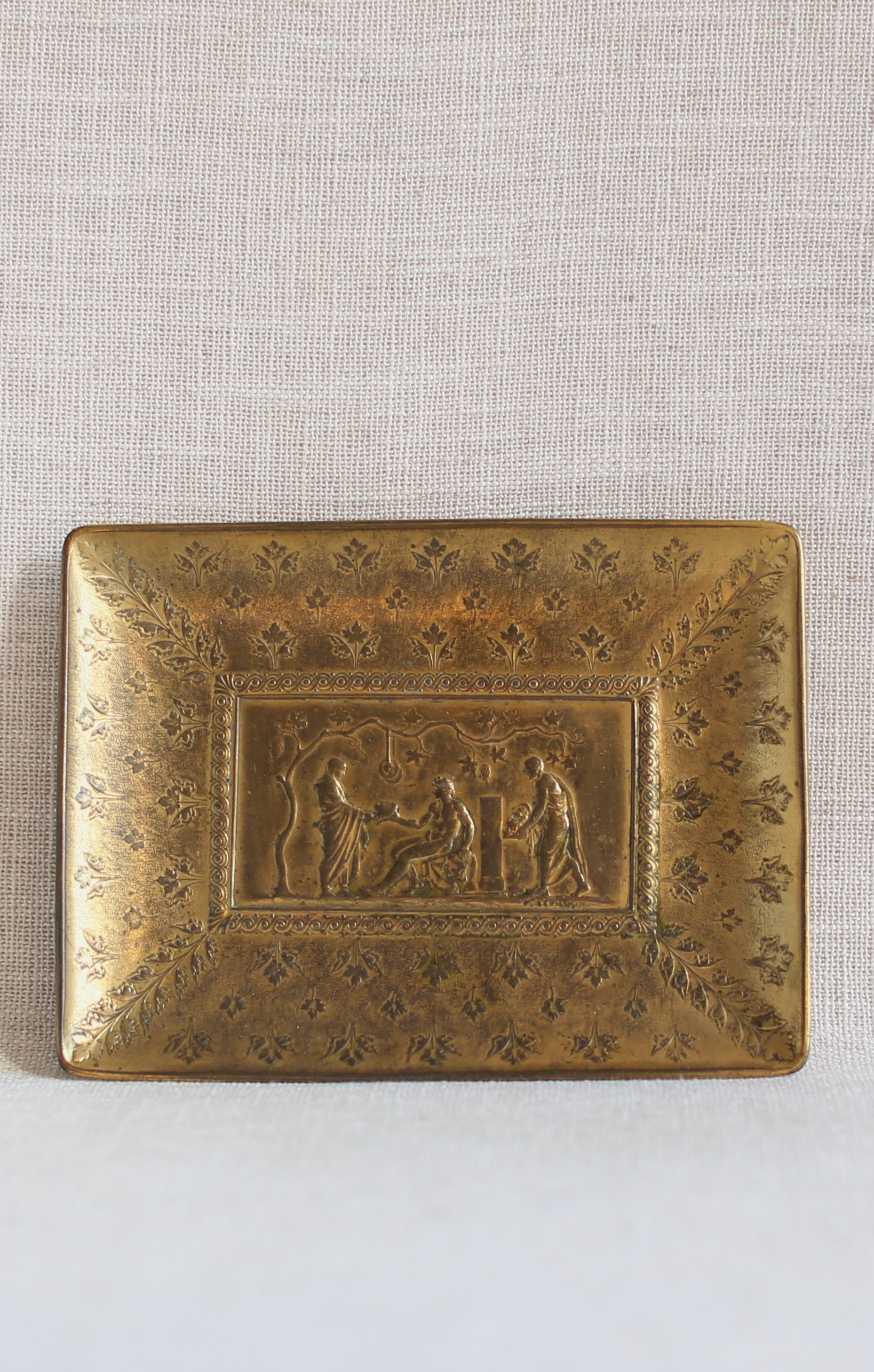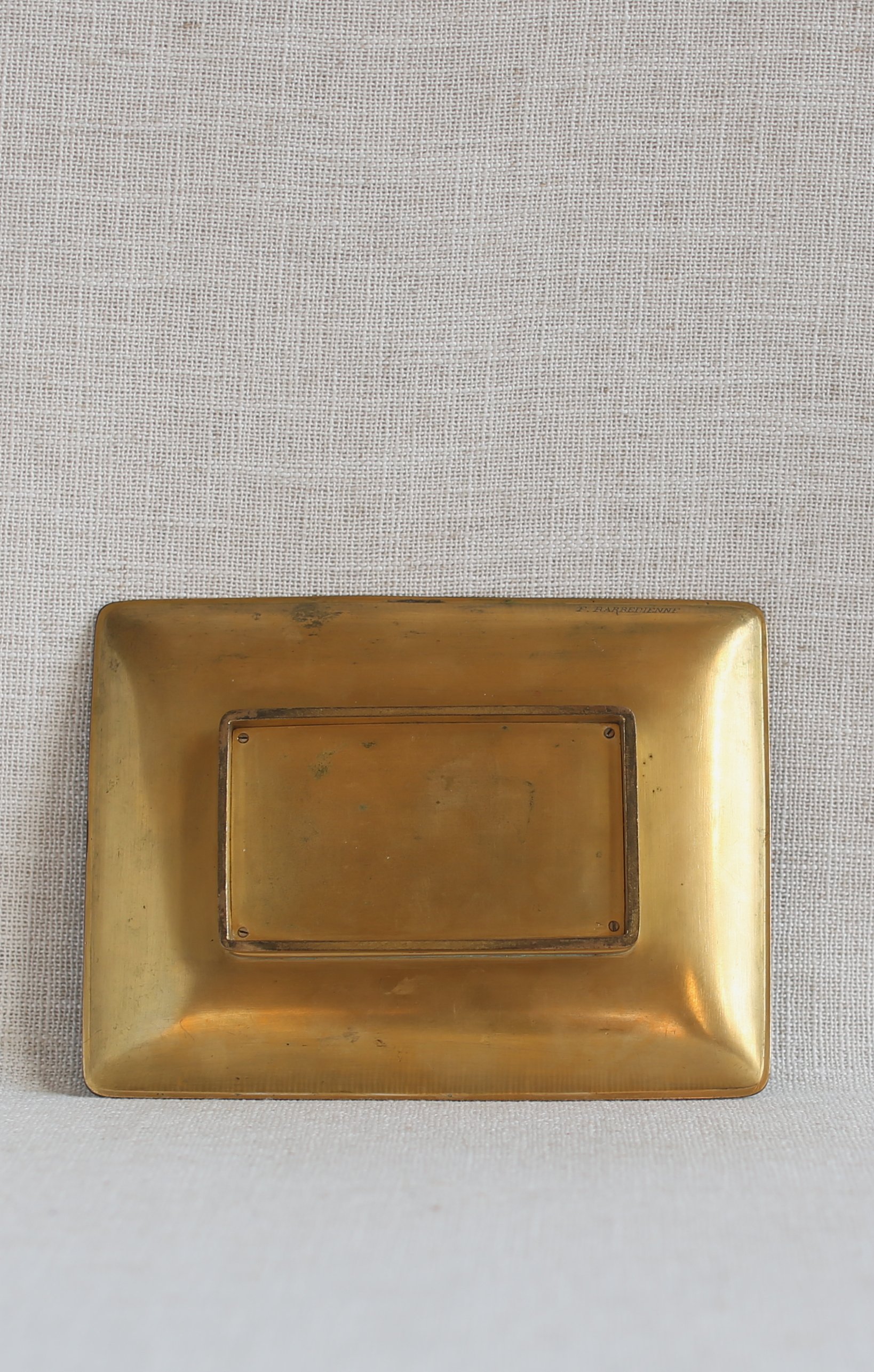 Image 1 of 8
Image 1 of 8

 Image 2 of 8
Image 2 of 8

 Image 3 of 8
Image 3 of 8

 Image 4 of 8
Image 4 of 8

 Image 5 of 8
Image 5 of 8

 Image 6 of 8
Image 6 of 8

 Image 7 of 8
Image 7 of 8

 Image 8 of 8
Image 8 of 8









19th Century Gilt Bronze Tray
Gorgeous 19th century gilt bronze pen or letter tray designed by French sculptor Ferdinand Levillain that was cast and gilded by the French foundry F. Barbedienne. Sculpted in low relief Dionysus is depicted sitting on a stool underneath a grape arbor surrounded by his attendants. Signed F Levillain in the lower right hand corner on the front and signed F Barbedienne on the verso.
Condition: Good, some loss to gilt consistent with age
Dimensions: 7 3/4” x 5 7/8”, sits 1” T
†
About Ferdinand Levillain
Ferdinand Levillain (1837-1905) studied under the sculptor Jouffroy (1806-1882), before making his debut in 1861 at the French Artists Salon where he continued to exhibit until 1903. At the 1867 Universal Exhibition in Paris, he was praised for a Neo-Greek style bronze cup he made for the firm Blot and Drouard. He was not to become really famous, however, until 1871 thanks to his association with the great bronze founder Ferdinand Barbedienne, who began to exhibit Neo-Greek style lamps, cups, vases and candelabras on his stands. Levillain was overwhelmingly triumphant at the 1878 Universal Exhibition in Paris, where he was unanimously awarded the gold medal for his creations in the Classical style. The famous bronze caster Servant (1828-c.1890) declared in the report of the jury for Artistic Bronzes that the work of Levillain “chased like the finest jewels” and “so diverse and pure of form (…) are of the highest degree of perfection”.
Gorgeous 19th century gilt bronze pen or letter tray designed by French sculptor Ferdinand Levillain that was cast and gilded by the French foundry F. Barbedienne. Sculpted in low relief Dionysus is depicted sitting on a stool underneath a grape arbor surrounded by his attendants. Signed F Levillain in the lower right hand corner on the front and signed F Barbedienne on the verso.
Condition: Good, some loss to gilt consistent with age
Dimensions: 7 3/4” x 5 7/8”, sits 1” T
†
About Ferdinand Levillain
Ferdinand Levillain (1837-1905) studied under the sculptor Jouffroy (1806-1882), before making his debut in 1861 at the French Artists Salon where he continued to exhibit until 1903. At the 1867 Universal Exhibition in Paris, he was praised for a Neo-Greek style bronze cup he made for the firm Blot and Drouard. He was not to become really famous, however, until 1871 thanks to his association with the great bronze founder Ferdinand Barbedienne, who began to exhibit Neo-Greek style lamps, cups, vases and candelabras on his stands. Levillain was overwhelmingly triumphant at the 1878 Universal Exhibition in Paris, where he was unanimously awarded the gold medal for his creations in the Classical style. The famous bronze caster Servant (1828-c.1890) declared in the report of the jury for Artistic Bronzes that the work of Levillain “chased like the finest jewels” and “so diverse and pure of form (…) are of the highest degree of perfection”.
